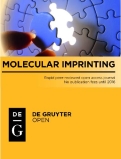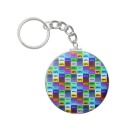|
|
Reference type: Book Chapter
Authors: Brüggemann O
Publication date: 2002
Chapter title: Molecularly imprinted materials - Receptors more durable than nature can provide.
Chapter number: 4
Page numbers: 127-163.
DOI: 10.1007/3-540-45345-8
Book title: Advances in Chromatography
Editors: Freitag R
Publisher: Springer
City: Berlin
Series title: Advances in Biochemical Engineering/Biotechnology
Volume number: 76
Abstract: The chapter describes the concept of molecular imprinting. This technology allows the fabrication of artificial polymeric receptors applicable in many areas of biotechnology. Polymers imprinted with selected template molecules can be used as specific recognition elements in sensors or as selective stationary phases in affinity chromatography or in capillary electrochromatography. However, also in solid phase extraction or immunoassays these polymers (MIP) are able to compete with traditional materials such as biological antibodies. Furthermore, polymers molecularly imprinted with so-called transition state analogue templates can be applied as catalysts. In other words, these kind of polymers may be used as artificial antibodies (plastibodies) or biomimicking enzymes (plastizymes). Compared to their biological counterparts, MIP offer different advantages such as simplicity in manufacturing and durability. Thus, the author expects MIP to have a major impact on the whole area of biotechnology
|


 multi mini-MIPs logo keychain
multi mini-MIPs logo keychain







 MIP Workshop WorldTour Womens baby doll style shirt
MIP Workshop WorldTour Womens baby doll style shirt







 multi MIPs logo apron
multi MIPs logo apron






